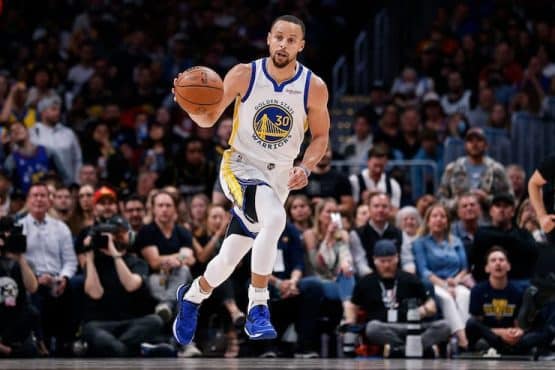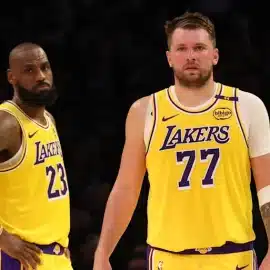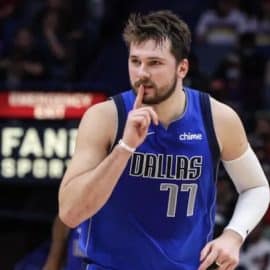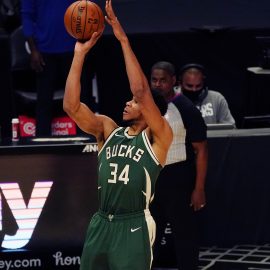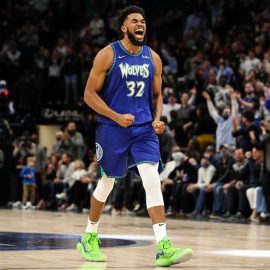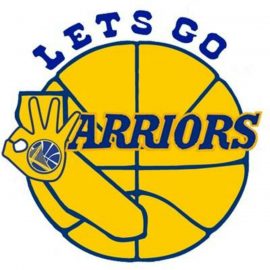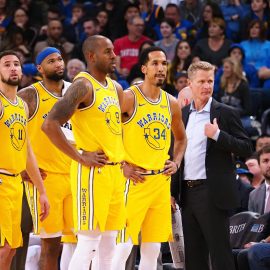With the Rockets moving on from the Dwight Howard Era, it’s up to Clint Capela to hold down the fort for Houston on defense. Is he up to the task?
Though the big news out of training camp is that James Harden is now being referred to as the point guard on offense, the true test of Houston’s mettle this season will be Capela’s ability to slide his feet on the perimeter, protect the rim, grab rebounds, set strong screens, and happily do all the little things and the dirty work that Dwight Howard wasn’t willing to without post feeds.
For all the crap Howard endures, he played at an extremely high level for Houston during his tenure–and there’s a reason the Hawks shelled out the big bucks to bring him in since Al Horford was on the fence. That will become especially apparent this year if Capela cannot closely replicate what the former Rocket regularly accomplished in terms of defensive dominance.
As a 21-year-old sophomore, the 6-11 center with a 7-5 wingspan averaged 7.0 points on 58.2 percent shooting, 6.4 rebounds, 1.2 blocks, 0.8 steals, and 0.6 assists in 19 minutes per night while appearing in 77 games. Looking deeper, in 35 starts Capela contributed 8.3 points on 55.2 percent shooting to go with 7.7 rebounds, 1.1 blocks, 1.0 steal, and 0.9 assists to 1.2 turnovers in 24 minutes per contest. In 42 games off the bench, he averaged 6.0 points on 62.1 percent shooting, 5.3 rebounds, 1.3 blocks, 0.6 steals, and 0.4 assists to 0.5 turnovers in 15 minutes per night.
Judging by the numbers and what I’ve witnessed personally, Capela struggles to make decisions when catching the ball in pick-and-roll decisions offensively if he’s not able to simply gather and go up for a slam. His block numbers were surprisingly better in nine minutes per game less off the bench, and he shot better off the bench too. Part of that is Capela was playing at the 4 alongside Howard a lot prior to the All-Star break. Capela was forced to step away from the rim on defense (where rejections are most prevalent) and meanwhile the lane became too clogged on offense (thus negatively affecting his shooting percentages). But these stats could also point to the idea that Capela might struggle with a 30-plus minute per game role against starting centers. It’s much easier to look great against backups than sustain that success over an entire game with the league’s toughest (and increasingly more skilled) centers.
Offensively there’s zero reason to believe that Capela can reach Howard’s level, but the good news is that Houston doesn’t really want that. Howard has awkward-looking post moves, but his one-on-one attacks were frequently more impressive and useful than Harden’s when it mattered in the playoffs. Even if Capela had semi-solid post moves, Houston would waste them. Therefore, he can free himself to the plan of wreaking havoc on offense by setting countless screens and diving to the rim over and over. The good news for Capela is that he has a leg up on the more important end for his position and for his situation in southeast Texas.
Speaking of his situation, it’s one that lacks much defensive firepower outside of Pat Beverley and Trevor Ariza. Both of those players project to play 30-plus minutes per game, but James Harden’s defense is hilariously bad, Mike D’Antoni is coaching the club, and Eric Gordon and Ryan Anderson are there too. This team could realistically be scoring 110 per outing and still finish below .500 because of a dismal defense. It’s in the cards. Then again, Capela could be a breakout player and receive consideration for Most Improved Player for a playoff-bound team. Only time will tell.
The good news for Houston is that Capela has a $2.3 million team option on his contract for 2017-18, so there’s plenty of time for him to figure things out before they need to commit long-term. Capela has all the tools to be an effective starting center in the NBA, especially if he can continue to harness his strengths while making minor strides in his areas of weakness. One of those issues is his free-throw shooting, which is on pace to soon be the worst in league history among players with over 1,000 attempts. Capela has 234 attempts (making just 35.9 percent) through 1,561 minutes.
Opposing teams will take advantage of his presence on the floor by fouling in order to slow Houston’s offense down. Spurs’ coach Gregg Popovich is already plotting it–and planning his terse response to post-game questions regarding it. Capela really needs to take a page out of new teammate Chinanu Onuaku’s book in an effort to bring Rick Barry’s underhanded free throw back in full force. However, regardless of what Capela does in terms of form in order to make it happen, there needs to at least be a moderate improvement closer to 50 percent. Shooting sub-40 percent from the charity stripe simply isn’t going to fly if the Rockets are going to become real contenders, and this is probably his most glaring weakness. Capela’s inability to catch and make a quick pass under pressure or put the ball on the ground will be somewhat mitigated by his teammates passing the ball to him at the right moment. Sometimes it’ll be unavoidable that Capela has to take a dribble towards the basket or read the defense and find the open man, but Harden and others should usually take care of that stuff.
In a defined role that should suit him perfectly, the Swiss center has a chance to shine bright this season and blast off in a big way. Harden has to commit defensively, and overall player health is always a main concern for every team. Nevertheless, Capela is Houston’s X-Factor in 2016-17; his rise or regression in an expanded role is the key to the Rockets’ postseason hopes.
Add The Sports Daily to your Google News Feed!
